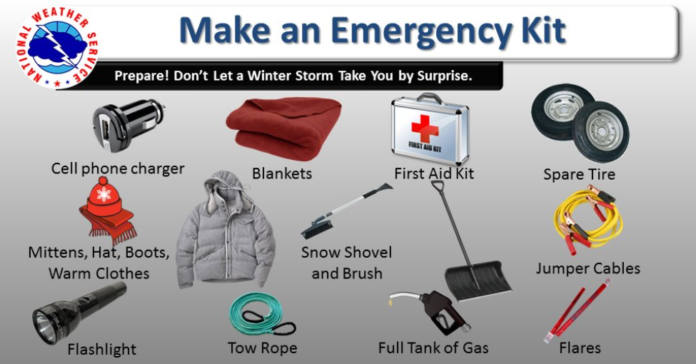When inclement weather happens, it’s important to be prepared. One of the best ways to be prepared is to have an emergency kit. You can have emergency kits at home, work and your car.
What You Should Have in Your Emergency Kit
Be prepared for winter weather at home, at work and in your car. Here’s what you should have in your emergency kits, according to the experts at weather.gov:
At Home/Work
Your primary concerns at home or work during a winter storm are loss of heat and power and possible shortage of supplies.
- Flashlight and extra batteries
- Battery-powered NOAA Weather Radio and portable radio to receive emergency information
- Extra food and water such as dried fruit, nuts, granola bars and other food requiring no cooking or refrigeration.
- Extra prescription medicine
- Baby items such as diapers and formula
- First-aid supplies
- Heating fuel: refuel before you are empty; fuel carriers may not reach you for days after a winter storm
- Emergency heat source: fireplace, wood stove or space heater properly ventilated to prevent a fire
- Fire extinguisher, smoke alarm; test smoke alarms monthly to ensure they work properly
- Extra pet food and warm shelter for pets
- Review generator safety: Never run a generator in an enclosed space
- Make sure your carbon monoxide detector is working correctly and that the outside vent is clear of leaves and debris. During or after the storm, make sure it is cleared of snow.
- Home fires are common each winter when trying to stay warm. Review ways to keep your home and loved ones safe.
In Your Car
Each year, on average, more than 5,000 people are killed and more than 418,000 are injured due to weather-related vehicle crashes, reports weather.gov.
- Mobile phone, charger, batteries
- Blankets/sleeping bags
- Flashlight with extra batteries
- First-aid kit
- Knife
- High-calorie, non-perishable food
- Extra clothing to keep dry
- Large empty can to use as emergency toilet, tissues, toilet paper and paper towels
- Small can and waterproof matches to melt snow for drinking water
- Sack of sand or cat litter for traction
- Shovel
- Windshield scraper and brush
- Tool kit
- Tow rope
- Battery booster cables
- Water container
- Candle and matches to provide light and in an emergency, lifesaving heat.
- Compass and road maps, don’t depend on mobile devices with limited battery life
Related:
- Tips for Driving in Snowy Conditions
- Understanding Winter Weather Terminology
- Live Weather Radar
- Tips to Prevent Frozen Pipes
Subscribe to our FREE Newsletter!
























